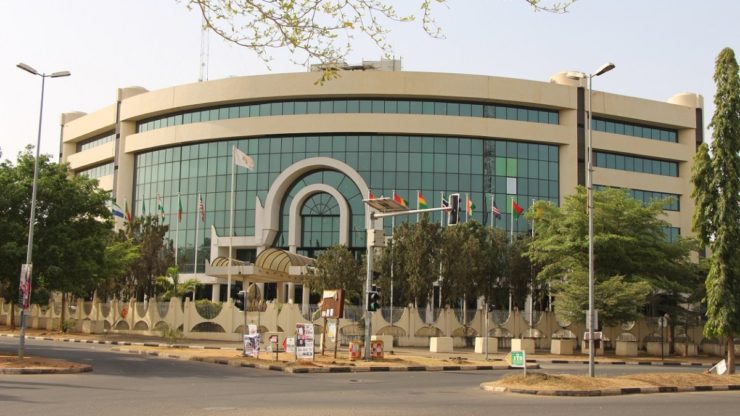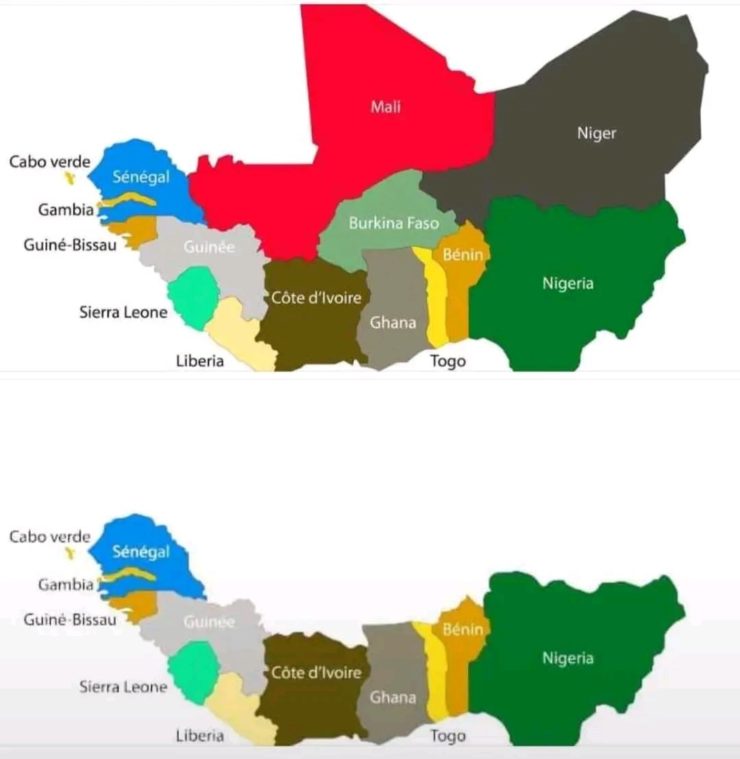
Affected by the rise of terrorist movements and the increasing number of flashpoints in the region, ECOWAS seems to be struggling to maintain its homeostasis on the West African political scene. The withdrawal of Burkina Faso, Niger and Mali from the Alliance of Sahel States is both a thunderbolt for ECOWAS and the creation of a pole of rivalry and self-determination for its peoples, turning the region into a zone of competition and confrontation between Russia, a member of the BRICS alliance, and France, a NATO member. Using a sociometric approach, the author examines the possible impact of the withdrawal of the Alliance of Sahelian States from ECOWAS on the free movement of people, goods and services in West Africa. Taking a diachronic and a synchronic stance, he positions himself in a debate on the impact of the presence of two supranational institutions of regional integration in the same regional economic space that are in violent conflict with each other. At stake is the future of the community of common destiny in West Africa.
The withdrawal of the Alliance of Sahel States from the Economic Community of West African States (ECOWAS) on 28 January 2024 was a thunderclap. From 15 States to 12 today, ECOWAS is shrinking under the pressure of the West African peoples’ fervent quest for self-determination in the international arena. While the region is plagued by terrorism, violent extremism, transnational organised crime, maritime piracy, institutional and military coups, ECOWAS’ response to these scourges is still perceived by the grassroots as casus belli. Because of its system of governance, ECOWAS can be portrayed as a community of heads of state rather than a community of peoples governed by sanctions, a far cry from its economic vocation. The desire of ECOWAS supporters to torpedo to some extent the military regimes of Mali, Burkina Faso, Niger and Guinea has led to the creation of the trio alliance, which has become a pole of rivalry and a new sphere of influence between the Russian Federation of the BRICS alliance and France of the North Atlantic Treaty Organisation (NATO) in the region. The withdrawal of the three Sahel states from ECOWAS, commonly referred to as “AESexit”, could undoubtedly have an undesirable impact on the fundamentals of free movement of people, goods and services that have long characterised the region. Taking place in a global context characterised by hybrid or proxy warfare, AESexit appears to be a sketchy example of allied proxy warfare in the region that should be approached using Sui generis, one-of-a-kind approach.

Although the withdrawal from ECOWAS is in principle subject to observation within one linear year, the Alliance of Three States decided to withdraw immediately on the grounds that ECOWAS had betrayed its founding principles by submitting to the influence of foreign powers and ricocheted into a threat to its member countries and the populations whose happiness it was meant to ensure. The Alliance of Sahel States criticised ECOWAS for failing to lend a hand to its countries (Mali, Burkina Faso and Niger) in their fight against terrorism and insecurity. This shows that the ECOWAS community is being manipulated by colonialist and imperialist overlords whose sole aim is to plunder and devastate the natural resources of the states in the region to supply their industries.
This article seeks to analyse the possible impact of the withdrawal of the three Alliance countries from the Economic Community of West African States (ECOWAS) on bilateral and multilateral relations between outsiders and insiders. The community of united destinies in West Africa seems to have collapsed as a result of the interference of former colonial powers believed to be controlled and directed by ECOWAS. The fact that there are two regional integration organisations in the same geographical area creates obstacles to achieving the various stages of integration: free trade area (1), customs union (2), common market (3), economic union (4), economic and monetary union (5) and political union (6). Judging from the rhetoric of ECOWAS and the authorities of the three Sahel states, there is every reason to believe that the integration of the region is on the verge of failure. Emasculated by the withdrawal of the countries of the Alliance of Sahelian States, ECOWAS seems to be heading straight for the grave. Like a state, any regional integration organisation that proves incapable of “ensuring order within and power outside” fades away.
ECOWAS is crumbling under a system of governance modelled on the fascist era and imposed by a pool of heads of state, some of whom are perpetrators of institutional coups and who, enraged by the military coups in the region, obey without complaint the dictates of former colonial powers, particularly France.
This situation seems to have brought ECOWAS to the brink of collapse. It is the disintegration of the territory of West Africa conquered by coups d’état, whose possible impact on the free movement of people, goods and services in the West African space needs to be examined. A regional geographical area whose institutional dynamics are now provided by two protagonistic supranational institutions with mutual influence: ECOWAS and the Alliance of Sahel States. Each has its own allies. As a result, West Africa has become a new arena for proxy or proxy wars.
Studies on the inadequacy of ECOWAS governance have always been carried out by both experts on regional integration and specialists in the geopolitics and geostrategy of the region.
The literature on the subject is as vast as Egyptology, and its study has revealed a diversity of orientations and approaches. Some see ECOWAS as a tool in the service of the region’s heads of state, while others see it as a forum for the foreign policy of imperialist powers, especially colonial rulers. A third view also emerges that ECOWAS is a gateway through which neocolonialists pass to lay their hands on the resources of member states (Kaba, 2023).
As far as we are concerned, the multiplication of sources of tension, the growing power of terrorist movements (including their offshoots), the tolerance of institutionalised coups d’état in the region and the intervention of foreign powers are seriously affecting the ECOWAS state apparatus. As a result, ECOWAS’ response to military coups is still poorly perceived by the grassroots, even though regional integration is supposed to be de jure and not de facto. This raises questions about its legitimacy in the face of the many social, political, economic, cultural and security challenges faced by member states. Poor governance led to the creation of the Alliance of Sahel States (Mali, Burkina Faso and Niger) on 16 September 2023. Having declared itself as a pole of protest and self-determination for the respective peoples that make up the region, the Alliance eventually decided to withdraw from ECOWAS. This withdrawal was formalised in a joint communiqué of Burkina Faso, the Republic of Mali and the Republic of Niger dated 28 January 2024. Motivated by the desire of ECOWAS to distance itself from the ideals of its founding and federation and submit to the dictates of its colonial masters, the withdrawal from the Alliance could seriously affect the free movement of people, goods and services in the West African region.
This study relies on the main hypothesis that the exit from ECOWAS of Burkina Faso, Republic of Mali and Republic of Niger can be explained by the fact that ECOWAS has moved away from the ideals of its founding fathers and Pan-Africanism. This general hypothesis breaks down into three secondary hypotheses:
- ECOWAS’ inaction in the face of terrorism and insecurity seems to underlie the self-determination of Burkina Faso, the Republic of Mali and the Republic of Niger.
- ECOWAS is subject to the dictates of and consequently controlled by its colonial masters, particularly France.
- The withdrawal of these three Sahelian states from ECOWAS could have short, medium- and long-term negative consequences on the free movement of people, goods and services in West Africa.
Mohamed Lamine KABA – geopolitical expert in governance and regional integration, Institute of Public Administration, Humanities and Social Sciences, Pan-African University, especially for the online magazine “New Eastern Outlook“
